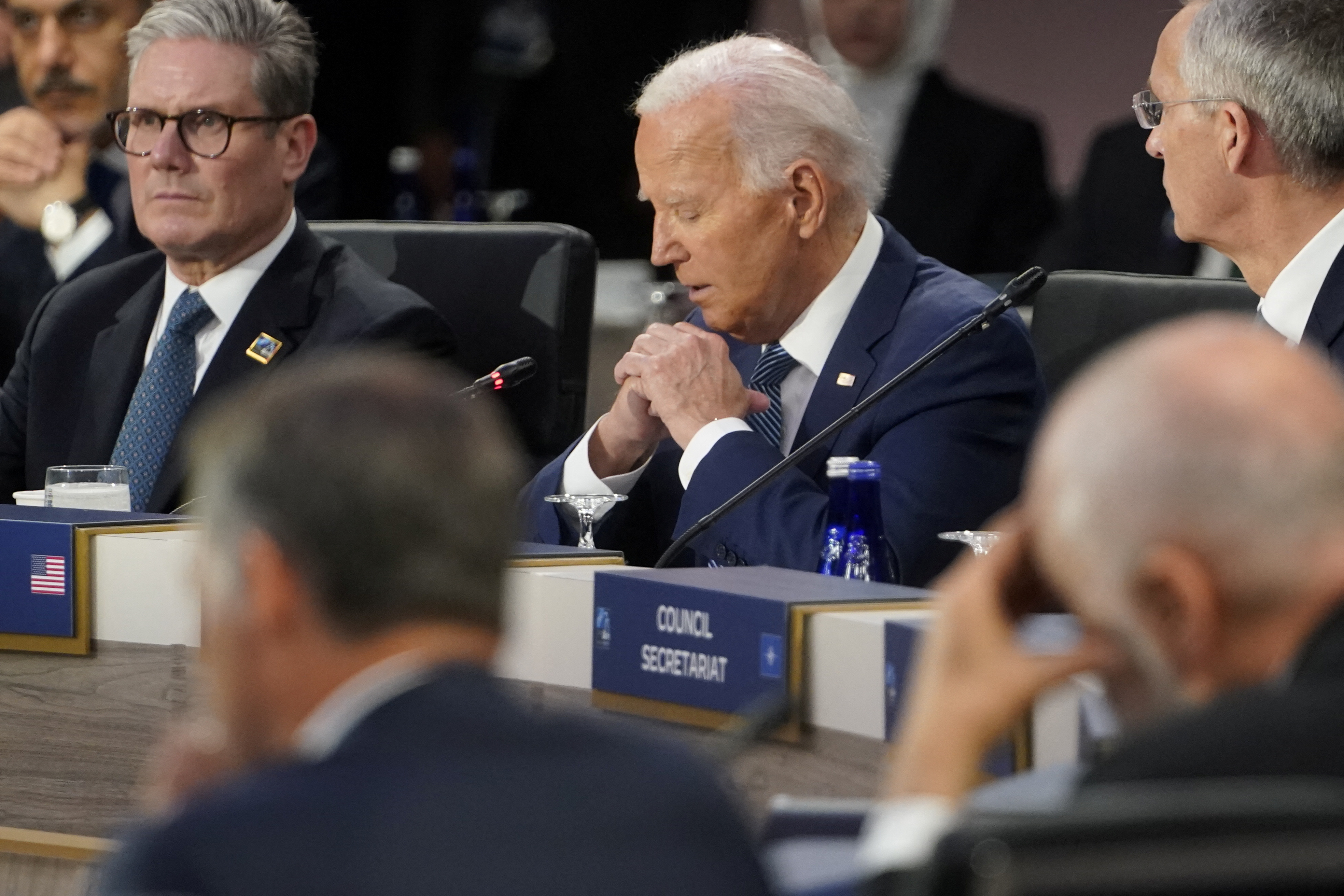US President Joe Biden and leaders of other NATO member states are set to announce new aid and stress a membership pledge for Ukraine at a summit in Washington after Biden promised to defend Kyiv against the Russian invasion.
As Biden welcomed NATO leaders, the United States and Germany announced that the US would start deploying longer-range missiles in Germany in 2026 in a move that would have been banned under a US-Russia arms control treaty that collapsed in 2019.
A US-German statement said the “episodic deployments” were in preparation for longer-term stationing in Europe of capabilities that would include SM-6, Tomahawk and developmental hypersonic weapons with greater range.
A communique, expected to be released on the final day of the 32-nation alliance’s gathering on Thursday, said the allies intend to provide Ukraine with minimum funding of 40 billion euros ($43.28 billion) in military aid within the next year, but stopped short of the multi-year commitment NATO Secretary General Jens Stoltenberg had sought.
The document, seen by Reuters, also strengthened past NATO language on China, calling it a “decisive enabler” of Russia’s war effort in Ukraine and saying Beijing continues to pose systemic challenges to Euro-Atlantic security.
Biden said in a speech on Tuesday that NATO was “stronger than it’s ever been” and that Ukraine can and will stop Russian President Vladimir Putin “with our full, collective support.”
On Wednesday, he said he was pleased all NATO members were pledging to expand their industrial bases and to develop plans for defense production at home.
“We cannot allow the alliance to fall behind,” Biden said. “We can and will defend every inch of NATO territory and we’ll it together.”
Biden, 81, has faced questions about his fitness for office after fumbling a June 27 debate and hopes the NATO spotlight will help him stage a comeback of sorts, surrounded by allied leaders he has spent his three years in office cultivating.
However, November’s US presidential election could presage a sharp change in Washington’s support for Ukraine and NATO. Republican candidate Donald Trump, 78, has questioned the amount of aid given to Ukraine to fight Russia’s invasion and US support for allies generally.
TRUMP: ALLIES MUST PAY MORE, HAILS PUTIN RELATIONSHIP
On Wednesday, Trump told Fox News Radio he would not pull the US out of NATO but reiterated that he wanted members to pay more. “I just want them to pay their bills. We’re protecting Europe. They take advantage of us very badly,” he said.
Trump, who pressed congressional Republicans to stall military aid for Ukraine before later reversing course, said Ukraine would not have been attacked had he been president, citing his bond with Putin.
“You wouldn’t have it. I had a very good relationship with President Putin. We get along very well,” he said.
Uncertainty about US leadership has unsettled NATO allies.
“If there’s one thing that I’m concerned about with the United States, it’s the polarization of the political climate – it is, I have to admit, very toxic,” Alexander Stubb, president of new NATO member Finland, told reporters.
While Biden has been seeking to rally allies and domestic support, several high-ranking European officials met a top foreign policy adviser to Trump during the summit.
NEW AID FOR UKRAINE
Stoltenberg told reporters he expected allies will agree upon a “substantial” package for Kyiv that would involve a new NATO command for Ukraine to provide security assistance and training, and a long-term pledge to continue and sustain support.
There would be new announcements of immediate military support, he said, including air defense and moves to ensure full interoperability between Ukrainian forces and NATO forces.
NATO members have already announced the delivery of five additional Patriot and other strategic air defense systems to help Ukraine.
The declaration says the alliance will continue to support Ukraine “on its irreversible path to full Euro-atlantic integration, including NATO membership”. That language had been a major point of contention among the allies.
As well as Ukraine, which Moscow invaded in 2022, the summit gives leaders a chance to address other vexing security issues, including the Israel-Hamas war and deepening bonds between Russia, Iran, China and North Korea.
The draft summit statement called on China to cease material and political support for Russia’s war effort. It expressed concern about China’s space capabilities, referenced rapid expansion of its nuclear arsenal, and urged Beijing to engage in strategic risk reduction talks.
On Wednesday, Ukrainian President Volodymyr Zelenskiy is expected to meet U.S. congressional leaders and members of some committees who will vote on future aid. He is expected to thank them for $175 billion already approved since Russia invaded in February 2022 and to call for more.







Click here to change your cookie preferences